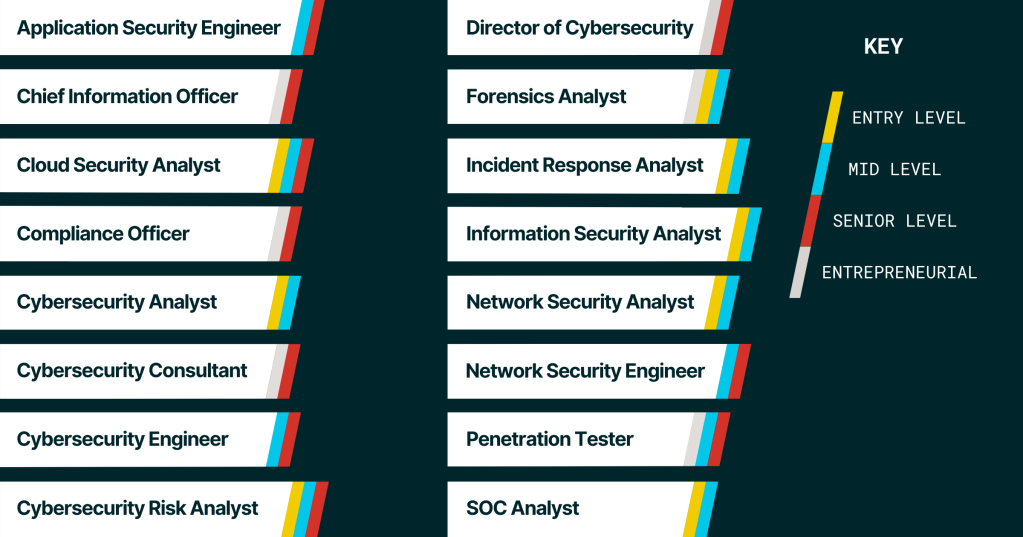We operate in a digital age where most data is stored electronically. This shift has resulted in a proliferation of accessible data and a surge in cyber threats. Consequently, cybersecurity has emerged as one of the most rapidly expanding sectors within the realm of information technology. Whether you’re embarking on an entry-level role or aiming to ascend the cybersecurity hierarchy, this field offers opportunities for individuals at all stages of their careers.
Not convinced yet? Here are a few data points to give you an idea of what the industry offers and where it’s heading.

Let’s review this skill set together by discussing how cybersecurity expertise can be acquired, applied, and transformed into a fulfilling career.
What can I do with cybersecurity skills?
Cybersecurity, also known as information security or information technology security, revolves around safeguarding computer systems from unauthorized access. Broadly, cybersecurity experts are entrusted with the security of IT infrastructure, mobile devices, networks, and data. On a more detailed level, their responsibilities encompass preventing data breaches and actively monitoring and responding to potential cyber-attacks.
Some specific tasks within cybersecurity include:
- Establishing and implementing user access controls and identity and access management systems.
- Monitoring network and application performance to identify unusual activity.
- Conducting regular audits to ensure compliance with security practices.
- Deploying endpoint detection and prevention tools to thwart malicious intrusions.
- Implementing automated patch management systems to keep applications up-to-date.
- Enforcing comprehensive vulnerability management systems for all on-premises and cloud assets.
- Collaborating with IT operations to develop shared disaster recovery and business continuity plans.
- Partnering with HR and team leaders to educate employees on identifying suspicious activity.
Many cybersecurity professionals come from backgrounds in programming, systems or network administration, mathematics, or statistics, and these skills are indeed valuable. However, qualities that can’t be taught, such as critical thinking, curiosity, communication, and a fervor for learning and research, are equally valuable. These qualities are not confined to any particular background, as companies seek diverse talent to combat the ever-creative nature of hackers. To outsmart cyber adversaries, cybersecurity professionals must embody creativity themselves.
Listen as Josh Cabrera, a security analyst at CyberSecOp, talks about a very important skill that cybersecurity professionals need the most in their careers:

You have to be able to explain technical things to all audiences. No matter where you are in security, you’re going to be advocating for yourself, for your own ideas, for security, in organizations that typically see security as a cost. So you have to be able to advocate for what you think is best and whether that’s an end user mid level management, C-level executive you have to be able to get buy-in for whatever technical thing you want to do.
So you have to be able to explain, like, okay, this is what we wanna do, gloss over the nitty gritty, here’s why you should care. That probably goes for all aspects of life but I think because security professionals, we spend so much time under the hood we have to take a step back and say, you know what matters and what doesn’t matter, and then turn that into effective communication.
Discover your career opportunities
Cybersecurity skills open up a wide range of career opportunities around the world.

Expert advice
When you find interesting opportunities, apply even if you only have 60% of the required skills. Tailor your resume to the job, and take a chance. The worst outcome is no response, but you might just get a positive one. Don’t hesitate to compete; the outcome can be surprising.
— Tramaine Isaac, career expert at edX

How can I acquire cybersecurity skills and turn them into a career?
If you’re interested in pursuing a career in cybersecurity, we recommend considering these steps:
Comprehensive research is a fundamental aspect of every profession, and cybersecurity is no exception. Tap into the wealth of available information, whether through online searches for relevant job titles, immersing yourself in industry-specific podcasts, or establishing connections with professionals in your areas of interest.
Pro tip:
Explore your career possibilities. As part of your research, take every opportunity to learn more about topics in your desired field. Browse the edX course catalog at edx.org to see what cybersecurity-related topics, courses, and programs interest you, and start advancing your career today.
Networking is a vital part of the research phase, often underestimated in its impact on your career journey. To gain clarity about your career goals and aspirations, dedicate time to converse with industry professionals to glean insights into their daily experiences. These interactions will help you assess whether a career in cybersecurity aligns with your interests and skills.
While building connections through networking, remember that effective networking centers on cultivating enduring relationships. Continue to nurture your professional contacts. When you’re ready to explore career opportunities, you’ll already have a network of relevant experts to seek guidance from or request referrals, providing you with a substantial advantage.
Pro tip:
We strongly encourage arranging informational interviews as a valuable means of gaining insights and building connections with cybersecurity professionals and hiring managers. Engaging with people in your field can open up opportunities to learn new skills, gain valuable guidance, and potentially lead to job referrals.
Check out our Networking Guide and Outreach Templates and Resources for help getting started.
In addition to gleaning insights from others’ professional journeys, maintaining a clear vision of your own career objectives and ambitions is paramount. Cybersecurity offers a variety of paths toward realizing your ideal career, each brimming with unique opportunities. While engaging with industry professionals, periodically reflect on your aspirations, recognizing that the possibilities are boundless.
Cybersecurity is a dynamic and challenging industry, demanding a diverse range of skills and proficiencies. To thrive in this competitive job market, aspiring professionals need a comprehensive skill set encompassing technical, professional, and functional expertise. Given the multifaceted nature of cybersecurity, refining specific skills is essential to stand out.
Discover the following list of key cybersecurity competencies to understand the qualifications required for success in this field:
Problem-solving — Cybersecurity experts confront intricate information security issues, requiring creative problem-solving skills across various technologies and digital environments.
Platform mastery — Security expertise extends beyond computers to encompass operating systems, mobile devices, cloud networks, and wireless networks. Staying abreast of advancements in these areas is paramount.
Attention to detail — Vigilance and keen attention to detail are critical for identifying vulnerabilities and risks, as cybersecurity professionals continually monitor networks and respond with real-time security solutions.
Computer forensics — A foundation in computer forensics complements cybersecurity, aiding in understanding recovery processes and fortifying digital asset protection.
Continuous learning — The ever-evolving cybersecurity landscape mandates a commitment to staying current with industry trends and best practices through ongoing self-education.
Ethical hacking — Grasping how systems can be exploited is vital for effective defense. Many cybersecurity experts acquire ethical hacking skills to anticipate and thwart potential attacks.
Clear communication — Regardless of your cybersecurity role, the ability to communicate technical and business concerns clearly and succinctly is crucial.
Beneath these skills lies a passion for the field. When you’re passionate about cybersecurity, you pay meticulous attention to details. Passionate professionals aim to protect and empower individuals with the knowledge needed for security-conscious behaviors. Embrace and showcase your passion — it sets you apart!
With a robust foundation and the essential skills outlined above, you’ll be well-equipped to explore myriad opportunities within the cybersecurity domain.
Expert advice
“Consider volunteering to gain soft skills and grow your community. Your program will equip you with the skills to perform your role, but volunteering is a great avenue to develop skills that you won’t learn in school. Volunteering can also help you step out of your comfort zone to become a more well-rounded person, which will help you get the jobs you want.”
— Heather Hans, career expert at edX

Sustaining your long-term career success in cybersecurity hinges on the continuous pursuit of knowledge and growth within your field. Fortunately, abundant opportunities for enriching your expertise are readily available. Consider these avenues:
Choose your specialty — The cybersecurity landscape has evolved into a diverse field, teeming with specialized areas. Your career progression often aligns with your chosen specialization. Select a cybersecurity niche that genuinely piques your interest. Your passion for the field makes it easier to excel and stay updated with its latest developments. Additionally, explore the various areas where cybersecurity experts are in demand, such as network security, application security, penetration testing, and research.
Self-education — If you prefer asynchronous, informal, or self-paced learning, self-education is an excellent choice. This approach accommodates diverse career goals, learning styles, budgets, and time constraints. Engage with relevant books, articles, and research papers and stay informed about industry news and trends. Utilize multimedia resources like videos, podcasts, and other content to expand your cybersecurity knowledge independently.
Online courses — For a structured and socially connected learning experience, consider online courses. Offering a range of instructor-led and self-paced cybersecurity courses, edX.org caters to various interests and needs.
Professional certifications — While not always required, professional certifications can significantly enhance your skill set and elevate your ability to compete in the industry. Explore the diverse certificate programs related to cybersecurity available on edX.org to further solidify your expertise.
Boot camps — Innovative boot camp programs, designed by experienced curriculum teams, offer an expedited path to achieving your career goals. These programs can equip you with the necessary knowledge and expertise in just 3–12 months, accelerating your journey toward your dream career.
In the realm of cybersecurity, continuous learning is the cornerstone of success. Choosing the right path, whether it’s specializing, self-educating, enrolling in courses, pursuing certifications, or joining boot camps, empowers you to stay at the forefront of this ever-evolving field.
A cybersecurity portfolio serves as a dynamic representation of your skills, expertise, and hands-on experience, offering a compelling way to impress potential employers. Through your portfolio, you can vividly illustrate your problem-solving acumen, critical thinking capabilities, and technical proficiency.
Before embarking on the journey of building your portfolio, it’s crucial to define your objectives and career aspirations within the cybersecurity realm. Identify your specific areas of interest, whether it’s network security, penetration testing, incident response, or secure coding. This clarity will guide you in selecting and crafting projects that align precisely with your goals, enabling you to showcase your mastery in those particular domains.
Expert advice
“Projects are your most effective currency while job searching. Feedback we have received from employers is that a great portfolio stands out because it takes the opportunity to explain the ‘why’ and ‘how’ behind your projects.”
— Cassie Burns, career expert at edX

Once you’ve completed your cybersecurity projects, meticulous documentation is essential. Develop comprehensive project reports that outline objectives, methodologies, tools employed, challenges encountered, and outcomes achieved. Highlight the specific skills and techniques utilized in each project. Additionally, consider incorporating visual aids such as diagrams or infographics to enhance the clarity of your documentation. Your reports should be so detailed that they serve as practical guides for replicating your processes and obtaining similar results.
Constructing a portfolio enriched with cybersecurity projects is a potent strategy for elevating your career prospects in this field. By curating diverse projects, emphasizing hands-on experience, and presenting your work effectively, you not only demonstrate your skills but also equip yourself with a valuable tool to showcase your expertise.
Once you’ve achieved your initial milestones in the cybersecurity field, it’s important to take a moment to celebrate your accomplishments. Every success along your career journey deserves recognition, and we encourage you to acknowledge your achievements.
However, it’s essential to remember that this is just the beginning of your journey, not the end. Embrace the ongoing process, practice patience with yourself, and understand that career paths often have their share of twists and turns.
Here are some ways to continue your growth in the field of cybersecurity:
Continuous learning — Cultivate a habit of exploring our extensive course catalog on edX.org for ongoing educational opportunities. Whether it’s refreshing your skills, deepening your industry knowledge, or exploring related subjects that align with your interests, continuous learning is key.
Advancement — Advancing in cybersecurity can vary widely depending on your industry and role. Consider progressing to positions like a cybersecurity engineer or even exploring entrepreneurship by establishing your own cybersecurity consulting firm.
Career exploration — Periodically assess your job satisfaction and daily responsibilities. If you find that your current role doesn’t align with your preferences, analyze what aspects you enjoy and what you find less fulfilling. Look out for growth opportunities within your organization and remain open to career shifts that leverage your background, skills, and passions.
In the dynamic world of cybersecurity, embracing change and a commitment to continuous learning are vital for long-term success. Your career journey is ever-evolving, and adapting to new opportunities and challenges will be instrumental in your ongoing growth and achievements.
What could my career look like with a cybersecurity skill set?
While it’s challenging to predict precisely how a cybersecurity skill set will shape your life, insights from ISACA’s 2023 State of Cybersecurity report offer valuable perspective:
High demand for cybersecurity skills — Cybersecurity expertise is in high demand, with 59% of cybersecurity leaders reporting understaffed teams. Technical skills such as identity and access management (49%), cloud computing (48%), data protection (44%), incident response (44%), and DevSecOps (36%) are increasingly sought after. Soft skills like communication (55%), critical thinking (54%), problem-solving (49%), teamwork (45%), and attention to detail (36%) are also gaining importance.
AI’s influence on cybersecurity — AI is reshaping the cybersecurity landscape, with 48% of organizations emphasizing the significance of cloud computing, which often hosts AI systems. Data protection skills (44%) are crucial, as safeguarding the data AI relies on is paramount.
Promising future with challenges — Of those surveyed, 78% anticipate an increase in demand for technical cybersecurity contributors and 48% foresee an increase in the demand for cybersecurity managers. Budget considerations are evolving as well, with 51% expecting at least a modest increase in the next year.
In our interconnected digital age, particularly with the integration of AI, robust cybersecurity measures have become a necessity, not a luxury. This underscores the value and high demand for cybersecurity skills. To seize opportunities in the cybersecurity field, plan your career and upskilling accordingly, embracing the innovations in this space.
Expert advice
“My day-to-day is a balance between dealing with things that are urgent versus important. So urgent tasks include alerts, a new client, or some ongoing investigation. At the same time mixing in things that are important. So doing, the actual onboarding of new clients, gathering and writing documentation, improving our processes. It can be something technical, like writing a script or it can be something like building out a written procedure. For the most part, I’m managing myself, I’m identifying what needs to get done, and it’s really important to stay in constant communication with my team, which is pretty small.”
— Josh Cabrera, security analyst at CyberSecOp

What are my next steps?
Learn more about cybersecurity:
Register for a course on edX to learn about a variety of topics within the field of cybersecurity, such as Penetration Testing and Incident Response, Finding Your Cybersecurity Career Path, and Cybersecurity Risk Management.
Watch a session:
Watch a relevant session on our Events page to learn more about the industry and other professionals’ experiences within it.







